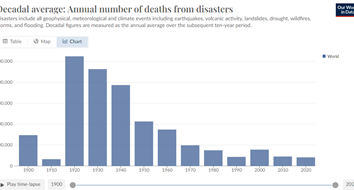It’s a headline that certainly grabs your attention.
“Georgia’s Experiment in Human Sacrifice,” read the title of an April 29, 2020 article in The Atlantic.
Written by staff writer Amanda Mull, the story suggested Georgia Gov. Brian Kemp’s decision to reverse course on the state’s shutdown and lift restrictions on businesses was an experiment to see “how many people need to lose their lives to shore up the economy.”
The decision, readers were told, was reckless and deadly.
“Public-health officials broadly agree that reopening businesses—especially those that require close physical contact—in places where the virus has already spread will kill people,” Mull wrote.
Without the government to protect them, all Georgians could do is “try to protect themselves as best they can,” Mull said. But she concluded that, because of the way the virus works, another deluge of cases “could be inevitable.”
“[It] may be two or three weeks before hospitals see a new wave of people whose lungs look like they’re studded with ground glass in X-rays,” Mull wrote. “By then, there’s no telling how many more people could be carrying the disease into nail salons or tattoo parlors, going about their daily lives because they were told they could do so safely.”
A year ago today.
— Jon Miltimore (@miltimore79) April 29, 2021
The same month @TheAtlantic published this fatuous article, they rejected one submitted by a professor of medicine at Harvard Medical School arguing for a focused protection strategy in lieu of lockdowns.
Oops. pic.twitter.com/iPWnEIwhWd
A Failed Prophecy
Mull’s lurid predictions didn’t come to pass. Today the state’s COVID mortality rate stands 30-35 percent lower than many states that enforced strict lockdowns, such as New Jersey, New York, Rhode Island, and Massachusetts.
While the article’s claim that Georgia was committing “human sacrifice” was hyperbolic, it was not particularly unique. Other publications would use similar language—”The Republicans Take America on a Death March,” one New Republic headline blared—when other states began to lift pandemic restrictions.
But The Atlantic is not The New Republic. It’s perhaps the most esteemed magazine in America. It’s where the “smart people” go to read because it still cares about good journalism and features writers like Graeme Wood.
How did The Atlantic fail so badly? The answer isn’t hard to find. Like so many media publications, the magazine fell prey to fear. Once this happened, the pandemic became a moral struggle between those who care about human lives and those who care about the economy. In taking up their crusade, the magazine, like many, fell for a simplistic fallacy: more government restrictions automatically equals fewer deaths.
That this assumption is fallacious is increasingly obvious today, with numerous open states seeing COVID cases decline even as restrictive states continue to struggle. At the time, however, the fallacy was less clear.
One reason the fallacy persisted was because lockdowns had become scientific dogma that mustn’t be questioned. Indeed, the same month The Atlantic published Mull’s “human sacrifice” piece, the magazine declined to publish an article submitted by Dr. Martin Kulldorff arguing for focused protection in lieu of lockdowns.
A year ago @TheAtlantic declined to publish my piece arguing for focused protection instead of lockdowns. In a @davidfrum article, they are now praising Florida @GovRonDeSantis' focused protection strategy. Glad they are slowly turning around. https://t.co/3nYkChsCV4
— Martin Kulldorff (@MartinKulldorff) April 24, 2021
For those who don’t know, Kulldorff is a professor of medicine at Harvard Medical School. He’s also a biostatistician and epidemiologist at the Brigham and Women's Hospital in Boston.
Nevertheless, The Atlantic concluded Kulldorff’s opinions on the efficacy of lockdowns could not be published. Meanwhile, the magazine ran Mull’s article that compared lifting restrictions and allowing people to move freely to “human sacrifice.”
To be fair to Mull, the words “human sacrifice” do not appear anywhere in her reporting; they may very well be the work of an undisciplined editor with an overactive imagination. Nevertheless, Mull has no apparent scientific credentials, while Kulldorff is an epidemiologist with direct expertise in detecting and monitoring infectious disease outbreaks.
Yet Mull’s COVID musings were deemed publishable while Kulldorff’s were not.
One Year Later. What’s Changed?
A year later, a lot has changed.
As Kulldorff himself recently noted, The Atlantic is now running glowing profiles of Florida Gov. Ron DeSantis, one of the first governors to embrace a focused protection strategy over lockdown.
“[DeSantis] delayed closing bars and restaurants until after the end of the 2020 spring break. He ended restrictions early, allowing all Florida businesses to reopen in September,” writes David Frum. “The state of Florida never imposed a mask mandate, and DeSantis forbade local governments from collecting any fines for violations of their own mandates. Perhaps his most consequential decision was to reopen Florida schools to in-person learning in August 2020.”
These actions, Frum admits, were bitterly controversial. But their results were not.
“Florida ranks in the middle of the 50-state pack in cases and deaths over the course of the pandemic: 23rd in cases, 28th in deaths,” writes Frum.
Florida achieved these results despite having the second-highest percentage of people over 65 in the US, behind only Maine. (Something Frum doesn’t mention.) Meanwhile, the Florida governor can point to two major accomplishments.
“The first is that the unemployment rate in Florida never spiked as high as it did in some other states. As of March, Florida’s unemployment rate stood at 4.7 percent, placing it 19th in the country; California’s was at 8.3 percent,” Frum writes. “The second, and probably even more important for the long term, is that Florida opened its schools to in-person learning in August, putting students back in classrooms, even as instruction in many other states remained remote.”
What a difference a year makes.
Still, despite the clear failure of lockdowns—which caused severe unintended consequences that will persist for decades to come—and the failed prophecies of media Cassandras, in some ways, it seems we’ve learned little. COVID dogmas persist, and Kulldorff and other highly-credentialed scientists find themselves censored by YouTube for sharing medical opinions that challenge them. (Meanwhile, in a stroke of irony, YouTube CEO Susan Wojcicki recently was awarded the Freedom Forum Institute's “Free Expression Award.”)
But facts, as John Adams once said, are stubborn things. And nothing breeds humility quite like failure. So there’s reason to believe that once the pandemic dust settles a new generation will come to recognize F.A. Hayek’s immortal lesson on economics.
“The curious task of economics is to demonstrate to men how little they really know about what they imagine they can design,” the Nobel Laureate observed.
If humans can’t learn this bit of wisdom after 2020, I fear we never will.





